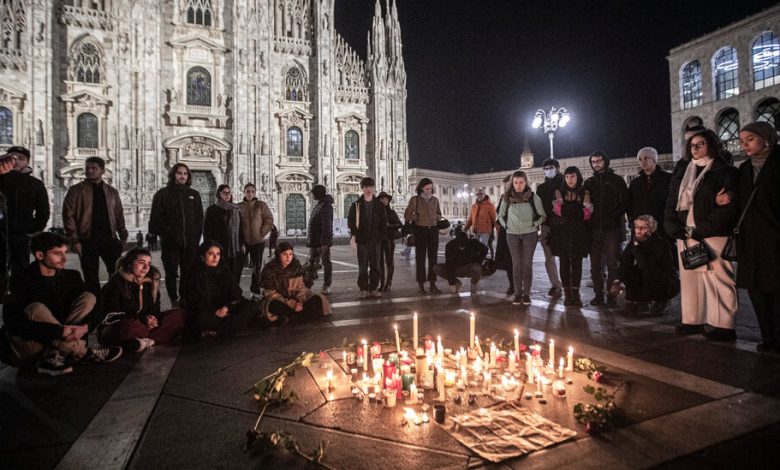Student’s Killing Pushes Italy to Confront Violence Against Women

When Italian senators debated a new law on Wednesday to strengthen protections for women, one name was at the center of their discussions: Giulia Cecchettin, a 22-year-old university student whose violent death has dominated newspaper front pages, newscasts, talk shows and the political discourse for more than 10 days.
Ms. Cecchettin went missing on Nov. 11, prompting a search that ended a week later with the discovery of her corpse, wrapped in plastic, in a ditch near a lake in the northern Friuli Venezia Giulia region.
She disappeared after meeting with an ex-boyfriend, Filippo Turetta, 21, at a mall; investigators put out a warrant for his arrest on suspicion of kidnapping and murder. He was picked up on Sunday by the police in Germany, who stopped him on a highway. Investigators have not spoken publicly about a motive in the case.
Mr. Turetta, who has so far not been formally charged, is awaiting extradition to Italy, which the German authorities say he has not opposed, according to his lawyer, Emanuele Compagno. Mr. Compagno said he had not spoken directly to his client.
The case has hit a nerve in Italy, where chauvinistic attitudes remain deeply rooted at all levels of society, heightening the challenges of addressing violence against women. Even before Ms. Cecchettin’s death, the country’s Interior Ministry had recorded the cases of more than 100 women believed to have been killed this year by intimate partners.
But Italians were also moved because Ms. Cecchettin’s life was cut short just as it was taking off. She was days away from graduating with a degree in biomedical engineering. The University of Padua, where she studied, has promised to award her degree posthumously.
Italy’s education minister, Giuseppe Valditara, called on schools to hold a minute of silence in honor of Ms. Cecchettin on Tuesday. Many students decided instead to protest violence against women by spending the minute making noise. “Let’s not remain in silence! For Giulia. For everyone,” one advocacy group, Non Una Di Meno, wrote on Instagram.
On Wednesday evening, the Senate unanimously passed into law a series of measures designed to toughen protections for women, including by streamlining the process for issuing restraining orders and giving priority to court cases that deal with domestic violence.
The statute book, however, is not where many experts see the problem.
“We have laws and they are fine, even if they can be improved,” said Elena Biaggioni a lawyer and vice president of D.i.Re, a national anti-violence network run by women’s organizations. “The problem is the application of those laws.”
Although the level of violence against women in Italy appears roughly the same as in other European countries, Ms. Biaggioni said, “the problem is structural and steeped throughout all of society. And modifying cultural paths takes time and requires action on many fronts.”
A report this year on a decade of policies to protect women found that government spending on the issue had more than doubled over the period, while the number of women killed by their partners had remained stable.
“The Italian government invests mostly in protecting women who are already victims of violence, but not in projects to prevent that violence,” said Rossella Silvestre of ActionAid, the nonprofit group that drafted the report. But prevention, she said, was “what is going to change those numbers.”
Valeria Valente, a senator from the center-left Democratic Party, said domestic violence in Italy reflected an entrenched chauvinistic mentality. “Think about the sexist joke, ads in Italy, harassment in the workplace and the inability of many men to accept the authority of women,” she said. “It’s not just about one violent man — it’s a general attitude.”
Ministers in Italy’s right-wing government — led by its first female prime minister, Giorgia Meloni — have also spoken of violence against women as a cultural issue in the days since Ms. Cecchettin’s death.
Mr. Valditara, the education minister, presented a project on Wednesday that called on high schools to hold discussion groups — at least 30 hours per year — with qualified moderators on the issue of violence against women. “It’s time to say enough, in a definitive way, in a total and drastic way to any residues of the chauvinistic and macho culture that is pervasive in society,” he said during the presentation.
The culture minister, Gennaro Sangiuliano, announced an initiative that encouraged students to make videos about gender-based violence, promising to have the best shown at the Venice Film Festival. Movies that deal with the issue of violence against women, he added, would be given special preference for funding from the ministry.
Even one of the ministers proposing the new law passed on Wednesday, Eugenia Maria Roccella, was careful to stress the limits of legislation. Laws, she said, had not protected Ms. Cecchettin, “nor any other women who did not suspect the violence brooding in the heart of the man who claimed to love them.”



